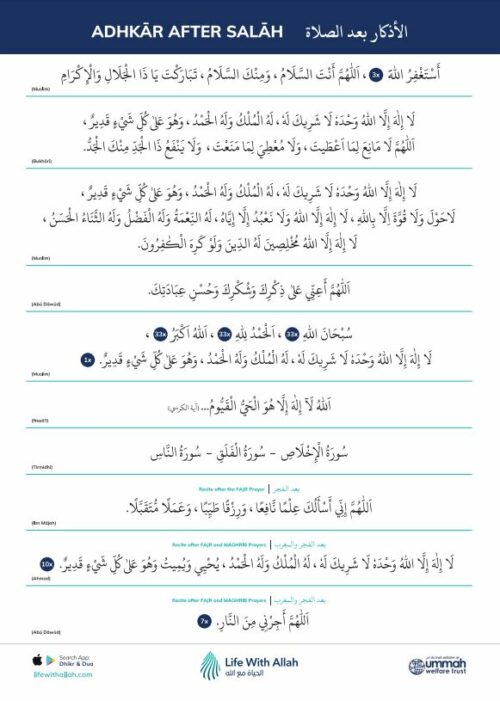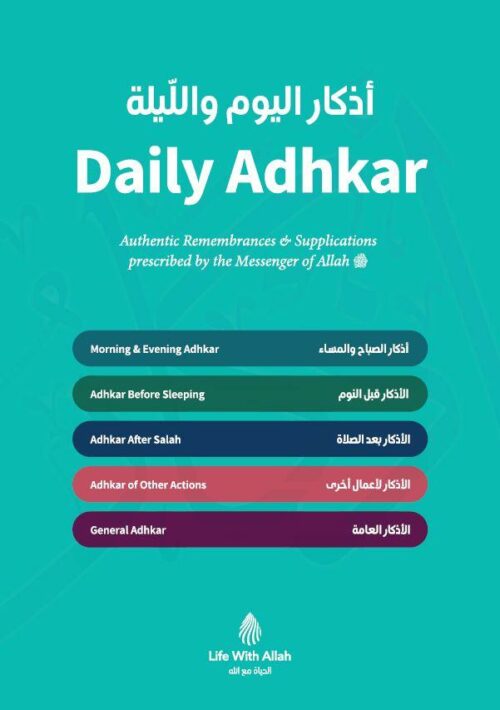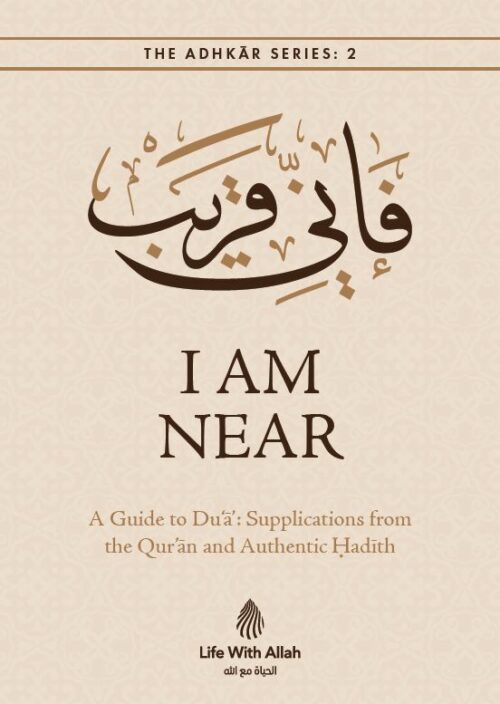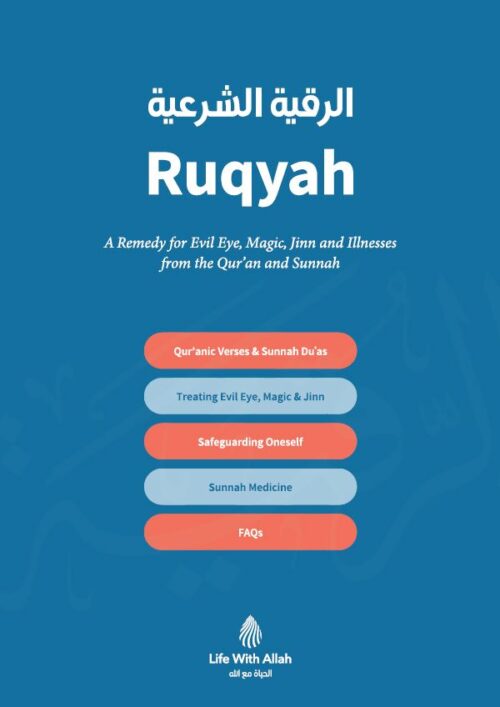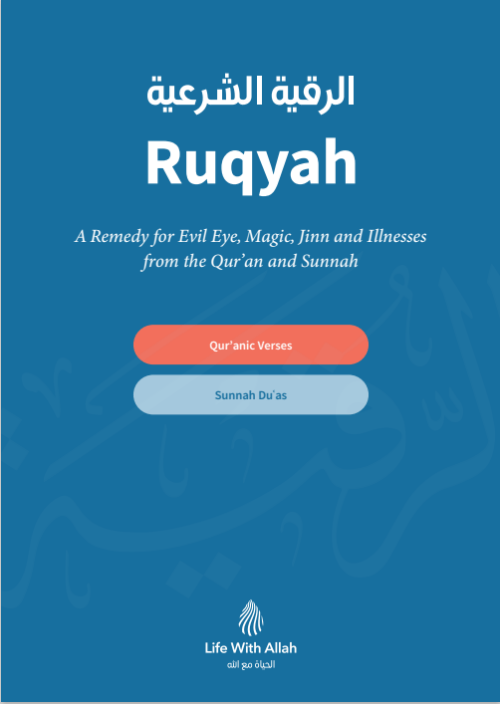The ‘sunnah adhkār’ are the remembrances and supplications prescribed by the Messenger of Allah ﷺ. These are the best words through which we can remember our Creator.
The Words of the Best of Men ﷺ
The Prophet ﷺ reached the pinnacle of perfection in his servitude of Allah. His knowledge, love, humility and reverence of His Creator was unmatched. His profound supplications and remembrances are a reflection of this, and hence comprise the most perfect formulae for duʿā’ and dhikr.
By reciting the adhkār mentioned or encouraged by the Prophet ﷺ, we can amass huge rewards. This is demonstrated in the ḥadīth of Juwayriyah (radiyallahu ‘anha):, where the Prophet ﷺ once returned in the forenoon and asked her if she had continued to remember Allah in the same position, as he had found her doing so before he left for fajr ṣalāh. When she replied in the affirmative, he ﷺ told her, “I recited four phrases three times after I left you:
سُبْحَانَ اللهِ وَبِحَمْدِهِ ، عَدَدَ خَلْقِهِ ، وَرِضَا نَفْسِهِ ، وَزِنَةَ عَرْشِهِ ، وَمِدَادَ كَلِمَاتِهِ
If everything that you have said today was put in the scales, these (phrases) would outweigh it” (Muslim).
In other words, the four phrases specified by him ﷺ would ensure far greater reward than the dhikr she (radiyallahu ‘anha) had been engaged in all morning, even though they require much less time to utter.
Our Own Wording
In general, there is greater merit in reciting the adhkār (remembrances) and duʿās (supplications) according to the wording of the Prophet ﷺ. There are occasions, however, where we may choose our own wording. This is when we ask and remember Allah in general times; or in a time which has been specified for duʿā, but we have not been told what to say. For example, in the last third of the night, it is highly recommended to make duʿā’, wherein along with the duʿās from the Qur’ān and Sunnah, you may also choose the words of the pious people, and your own duʿās, as the Prophet g said, “…Then one of you should choose any supplication that he likes, and call upon Allah – the Mighty and Exalted – with it” (Nasā’ī).
Sunnah Adhkar Prescribed by the Prophet ﷺ
There are some adhkār which were specified by the Prophet ﷺ. These are specific to a place, time, act of worship, and are specified in number or virtue. For example, the duʿā’ for entering the bathroom or the adhkār before sleep. These must not be invented by anyone, and we should recite what has been ordained in the Sunnah.
Qāḍī ʿIyāḍ (raḥimahullāh) stated, “Allah has ordained duʿā’. He taught His creation duʿā’ in His Book, and He taught the Prophet ﷺ duʿās for his Ummah. These duʿās combine the knowledge of Allah’s Oneness, knowledge of language, and desiring the best for his Ummah. It is not appropriate for anyone to turn away from the duʿās of the Prophet ﷺ. Shayṭān has tricked people in this regard, and has appointed evil people who invent supplications for them. The people then distract themselves with these duʿās, instead of following the Prophet ﷺ.”
Imām Qurtubī (raḥimahullāh) stated: “A person should supplicate with what is in the Book of Allah and the authentic Sunnah, and leave anything other than it. He should not say, ‘I will choose to recite such-and-such’, for Allah has chosen for His Prophet and His Friends, and taught them how to supplicate.”
Ibn Taymiyyah (raḥimahullāh) stated, “Undoubtedly, adhkār and duʿās are some of the best forms of worship. Worship is based on what has been divinely ordained and obedience; and not based on following one’s own desires or innovations. Thus, the Prophetic adhkār and duʿās are the best ways in which a seeker can remember Allah (subḥānahū wa taʿālā) and ask Him… Words cannot express the benefits and results which are obtained through them.”
Anyone who does not hold on tight to the Prophetic Sunnah in his worship and daily remembrances will come to regret it, become weary, and his temperament will become unpleasant. He will miss out on great good which results from following the Prophet ﷺ; who was kind and merciful to the believers, and extremely keen to benefit them. – al-Dhahabī (raḥimahullāh)
The Benefits of the Sunnah Adhkar
The following are five key benefits of including the sunnah adhkār in your daily schedule:
1. Fulfil Your Purpose in Life
Through the sunnah adhkār, we affirm the Oneness (tawḥīd), uniqueness and absolute perfection of Allah (subḥānahū wa taʿālā) on a daily basis. We renew our pledge of servitude (ʿubūdiyyah) to Allah by declaring our utmost reliance upon Him, praising Him and supplicating to Him Alone. Through the adhkār, we acknowledge our weakness and need for Him. We humble ourselves and express our need for Him for everything throughout the day, even if it appears to be something mundane (e.g. going to the bathroom or leaving the house). The adhkār will help us to love Allah, fear Him, have hope in Him, submit to Him and be grateful to Him.
2. Nurture Your Iman
The sunnah adhkār are a powerful means to strengthen our īmān. Īmān is like a seed, and righteous deeds are like water. If we water the ground without planting the seed, it will bear no fruit. Likewise, if we plant seeds but do not water the ground, there will be no fruits either. So we must always seek to strengthen our īmān on a consistent basis through good deeds, especially through the daily sunnah adhkār.
3. Purify and Discipline Your Nafs
Dhikr purifies the soul and trains the nafs. Cleansing our souls takes consistent effort, and the stains will not be removed with just one attempt. By having a strict regimen of daily dhikr, we can develop mastery over the nafs and this will — by Allah’s permission — lead to our souls constantly being purified and our hearts being illuminated.
One of the best ways to purify the soul is to always remember and think that Allah is with you. A Companion asked the Messenger ﷺ, “What is the tazkiyah (purification) of oneself, O Messenger of Allah?” He ﷺ replied, “To know that Allah is with him wherever he may be” (Ṭabarānī). This close connection with Allah, where we are always mindful of Him, makes us aware of what thoughts and feelings we let into our hearts. This helps us to purify our negative thoughts and actions, including the ill-feelings we have towards fellow believers, and the whisperings of shayṭān.
4. Protect Yourself From Evil
The sunnah adhkār will protect us from harm, illnesses, anxiety, grief, depression, devils, the evil eye and magic. We will attain peace and contentment in our lives, and develop more resolve to patiently deal with difficulties.
5. Earn Immeasurable Rewards
Reciting the sunnah adhkār at the prescribed times in the day is an easy deed, which does not take much time, but can transform our lives and lead us to earning unimaginable rewards.
We should strive to memorise and understand the meaning of the sunnah adhkār. Along with this, we should continuously read their specific virtues to motivate us, and ask Allah to grant us these huge rewards.
Whoever is unaware of the virtues of deeds will always find them to be difficult. – Abū ʿAbdillāh al-Barāthī (raḥimahullāh)


